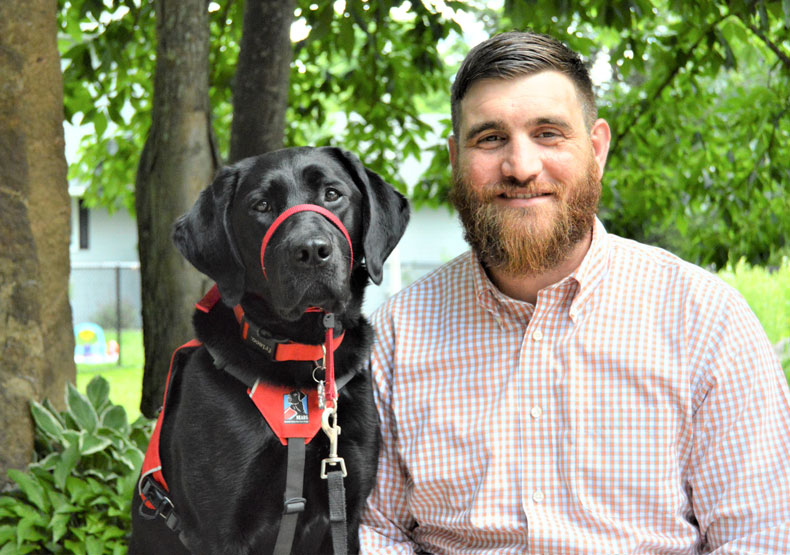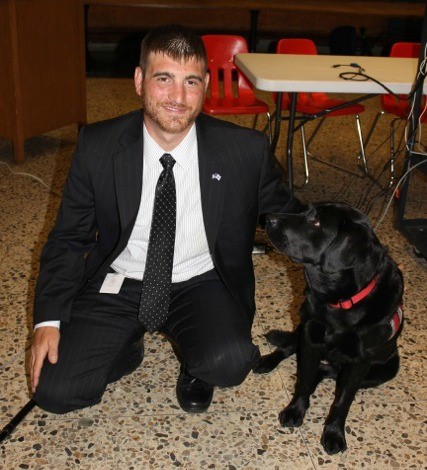Paying it Forward: How One Recent Graduate—and United States Veteran—is Using His Lived Experience to Help Others

Lambert and Sally, in her "work uniform", on-the-job for NEADS
Eighteen years ago, following a 16-month tour in Iraq with the 172nd Stryker Brigade Combat Team out of Fairbanks, Alaska, Kevin Lambert returned home with an all-too-familiar diagnosis among veterans: Post Traumatic Stress Disorder (PTSD). In July 2009, after connecting with the Massachusetts-based NEADS World Class Service Dogs, Lambert became the first veteran to receive a trained service dog from the nonprofit during their research phase. At a time when service dogs were largely used to assist individuals with vision and hearing impairments, the black lab with whom Lambert was paired proved instrumental in his transition back to civilian life.
 “Ronnie changed my life,” says Lambert who returned from combat with a spine injury
that caused him pain when walking. Service dogs are trained in up to 60 specific commands—from
turning light switches on and off to retrieving items from the refrigerator and closing
the door—none of which are aggressive in nature. Suffice it to say, Ronnie made Lambert’s
road to recovery more smooth than had he gone it alone.
“Ronnie changed my life,” says Lambert who returned from combat with a spine injury
that caused him pain when walking. Service dogs are trained in up to 60 specific commands—from
turning light switches on and off to retrieving items from the refrigerator and closing
the door—none of which are aggressive in nature. Suffice it to say, Ronnie made Lambert’s
road to recovery more smooth than had he gone it alone.
“She picked things up when I dropped them and allowed me to lean on her when getting up and down,” explains Lambert, who was using a cane for balance at that time. For veterans living with PTSD, a service dog’s companionship can be invaluable. When entering dark rooms, sensing someone approaching from behind them, or while experiencing an anxiety attack in public, the animals can be counted on to behave in very specific, dependable ways.
“No matter my reaction—to a car backfiring in the street or another loud noise—she remained calm and steadfast,” says Lambert of Ronnie. According to the Americans with Disabilities Act, a service dog is defined as one trained to assist an individual with a disability by performing at least one task related to the disability.
In a society where dogs are increasingly common in public settings, Lambert is quick to (gently) remind folks that—when service dogs are out and about at the grocery store or in Home Depot—they are always working.
“Approaching and/or petting service dogs in public [without permission from their handler] distracts them from their job,” says Lambert who quickly learned that children are far more likely to respect this boundary than adults.
After nine years spent with Ronnie by his side (while shopping at the mall, attending family events, even traveling to Disney World!), Lambert returned to NEADS hoping to adopt a “furlough favorite.” Instead, the former board member left with a new job—one that came with a familiar (furry) perk.
“Sally, another lab, was trained to accompany me in my work with clients,” explains Lambert, underscoring a key differentiator between service and assistance dogs: The latter are matched with public-facing professionals, from therapists to police officers, in order to put clients at ease in potentially stressful situations. Between 2018-21, while working for NEADS as a Program Development Administrator, Lambert and Sally enjoyed a successful partnership. Whether participating in community demonstrations or screening potential veteran clients and assisting them through the interview process, Sally had a profound effect on everyone with whom she came into contact. When Lambert left NEADS and Sally (whom he had officially adopted from the nonprofit) retired to be a full-time family pet, Lambert decided it was time for another transition—this time back to the classroom.
“I went from providing direct services to veterans—in suicide prevention, jail diversion, and housing—to working at the organizational level to help train current and future [mental health] providers to better treat veterans,” says Lambert, a 2024 graduate of the Master of Arts in Organizational Psychology program (and 2023 graduate of the BS in Psychology and Human Services program) at William James College. Across the years, one constant has endured: Lambert’s passion for educating others about the benefits service members and their families bring back into the civilian world.
“I jumped at the opportunity to [pursue my own education],” says Lambert who credits Jenny D'Olympia, PsyD, Director, Military Veteran Psychology and Train Vets to Treat Vets programs, as helping him to navigate the process. D’Olympia ultimately brought Lambert on as program development assistant for the Train Vets to Teach Vets program where he worked doing outreach, establishing relationships, and maintaining connections with veterans.
“Together, we did some continuing ed trainings—on moral injury and peer support—which led to partnering with another army veteran, Sergeant Jay Ball of the Framingham Police Department, to develop a safer [gun] storage suicide prevention program for veterans,” says Lambert.
Suicide Prevention for Military, Veterans, and Law Enforcement through Safer Firearm Storage: Lethal Means Counseling is offered in-person on a monthly basis; while the program focuses specifically on law enforcement and veterans' culture, it is largely applicable to myriad subgroups.
Lambert’s educational journey, including a pair of degrees from William James College, continues to enhance his consulting work. At Eagle Eye Consulting and Training, which he founded over the summer, Lambert offers tailored solutions and transformative results in organizational development—especially those keen on implementing or bolstering direct services to the military and veteran community. His ties to D’Olympia, who he has known for 15 years, remain strong; ditto for Lambert’s current role, as consultant to the TVTV program, which keeps him connected to campus.
“William James College has gone beyond inclusivity to make sure diverse populations feel like they belong, [and] that their experiences are not only recognized but also valued across the board.”
- Tags:
- In the Community
Topics/Tags
Follow William James College
Media Contact
- Katie O'Hare
- Senior Director of Marketing
- katie_ohare@williamjames.edu
- 617-564-9389
